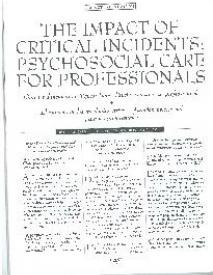THE IMPACT OF CRITICAL INCIDENTS: PSYCHOSOCIAL CARE FOR PROFESSIONALS
Impact Foundation - Knowledge and Advice Centre for psychosocial Care concerning critical incidents.
Are funeral operatives well prepared for the psychosocial impact their work may have on them?
All over the world, at times, people are confronted with critical incidents. The majority of persons who encounter critical incidents turn out to be resilient. People have shown over and over again to be able to overcome tragic life-events such as war, natural disasters, terrorist attacks or large accidents. Aftercare helps them to get over these painful experiences and establish a new balance. Only a much smaller group of affected people (20-25 %) may develop serious psychological complaints, and will benefit from more specific support or even specialized care.
Appropriate aftercare for those affected by a critical incident, requires a multi-disciplinary approach provided by a range of professionals and institutions, such as governmental institutions, rescue workers, uniformed services (police, firemen), repatriation specialists, funeral directors, etc. For best and effective care it is necessary for professionals to be well prepared, according to the latest evidence-based knowledge and best practices. Part of being well prepared as an organization is to take an inventory of the way employees may be afFected by these potentially stressful events: how to counter possible adverse effects and support the professional. Professionals might experience psychosocial consequences due to, for instance, (over)exposure to serious incidents, insufficiënt backing or support from their organizations, or lack of self-care. So, who takes care of the professional?
In 2002, Impact Foundation, Knowledge and Advice Centre for psychosocial care concerning critical incidents, was founded in the Netherlands. This (worldwide unique) organization acts as a knowledge-broker between scientists, practitioners, and (governmental) organizations in the field of aftercare. Scientific insights and best practices are brought together in many different products and made available to the relevant professionals or branch organizations. Examples of products are guide-lines for uniformed service workers on how to organize peer support, a guidance for religious care takers on their role during critical incidents, and a guidance for organizing a national commemoration service in case of national incidents. Also online tools are offered, like the Information Referral Centre Tripoli, a website containing relevant information on bereavement, commemorating and contact information for service providers and bereaved of the plane crash in Libya (2010), Furthermore, Impact develops teaching materials and books portraying professionals and their experiences with critical incidents. These materials offer insights in the professionals’ work, their strengths and challenges, and show in an accessible way what impact their work can have on them and how they cope with it.
Funeral operatives are also professionals who, by the nature of their work, have an increased risk of getting exposed to stressful events. Therefore, psychosocial care should have a central place in their business as well. Preventive measures like education, self-care, and mental check-ups can help funeral operatives to stay mentally healthy. This is a necessary condition to perform well as a professional. In a future edition of THANOS Magazine the Impact Foundation in cooperation with FIAT-IFTA will elaborate on the importance of psychosocial support for professionals, illustrated by some examples.
For more information about Impact Foundation, please visit our website www. impact, arq. org
FREDERIKE ZWENK & JOSEE NETTEN, SENIOR POLICY ADVISORS
Thanos | 69 | februari | 42-44


